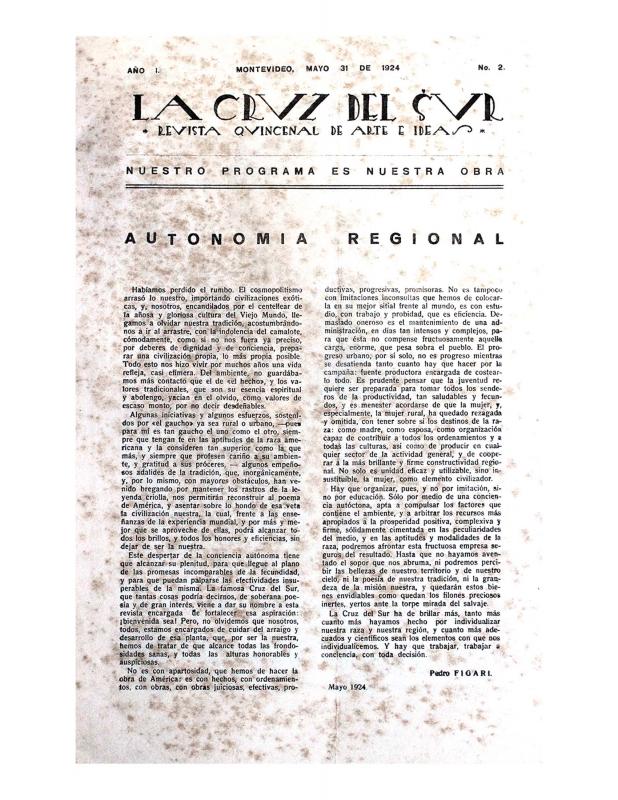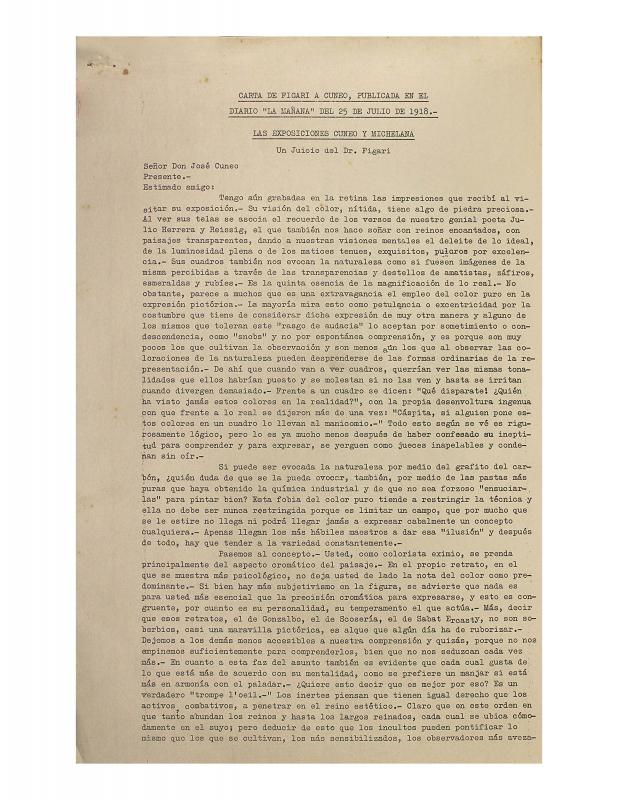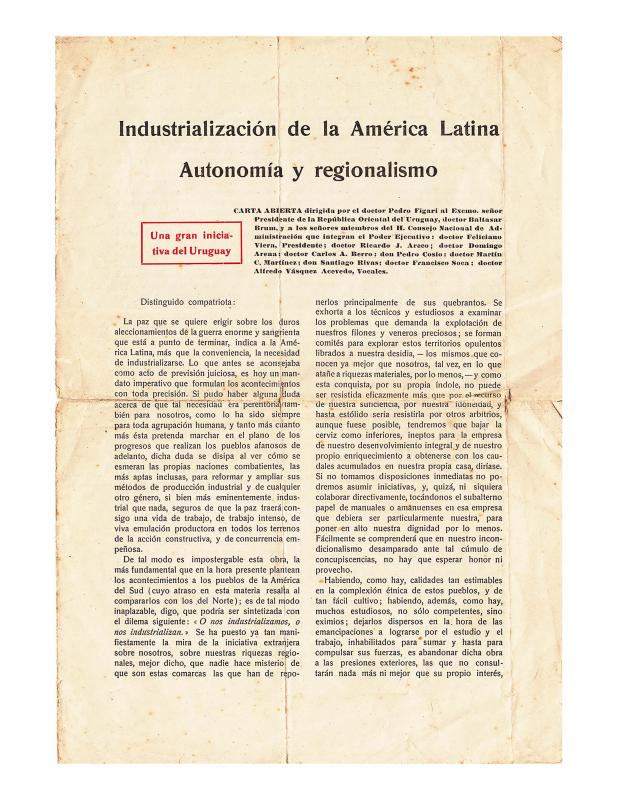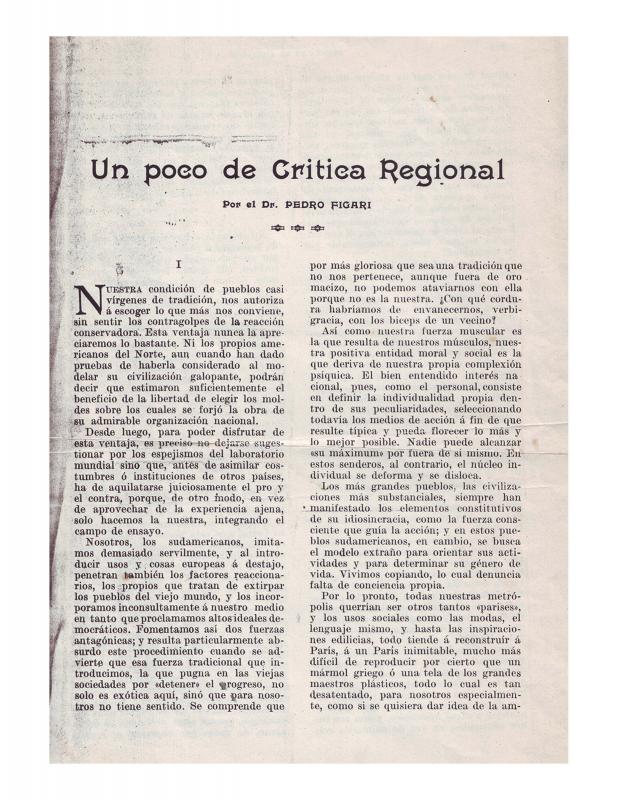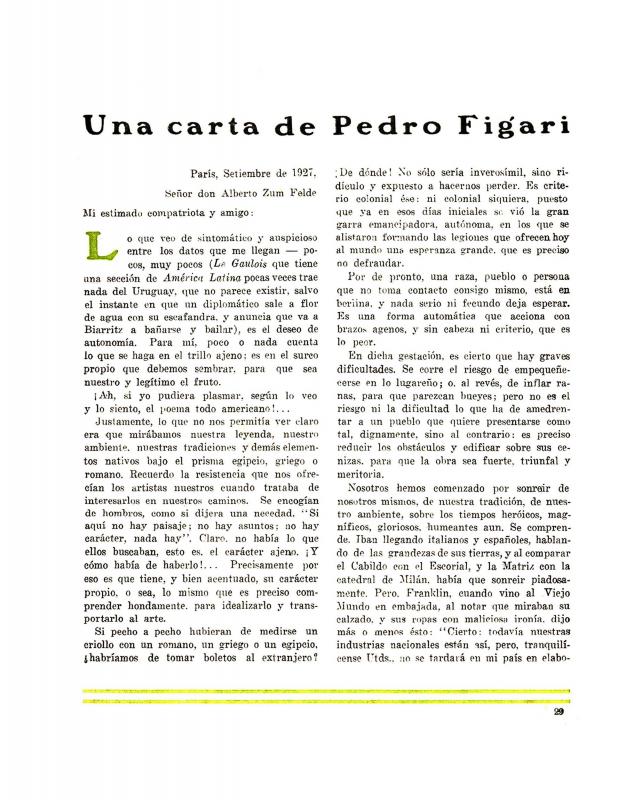Pedro Figari (1861–1938) was active in several different areas, as a philosopher, journalist, educator, lawyer, politician, and artist. He worked for the development of a universal humanism that included, and was based on, an empathetic knowledge of the cultural heritage of the region that was expressed in the local traditions, nature, and society. As a philosopher whose training was rooted in positivism, Figari was not anxious to see “civilization” falter at a time when knowledge and technology were offering unsuspected advances in the field of “progress.” This problem haunted him during the years he spent in Paris, when he could not envision the achievement of his long-sought homeostatic balance between the “dynamics of progress” (which was, in his opinion, a natural part of our evolutionary process) and its necessary logic in the sense of a “coexistence without conflict” that assumes the possibility of civilized coexistence within parameters that imply a certain stability of the system. In Historia Kiria he attempted to describe that ideal society that was both evolutionary and static, a society based on the simplicity and reason of “common sense” with no needless complications added by intellectual speculation. In this letter Figari restates his Americanist aspirations, always hoping that Latin American artists would stop trying to imitate “foreign” models. He explains that he is deeply skeptical of both the European world and civilization in general, a view that came to dominate his thinking in 1930. It is no coincidence that he quotes his friend Luc Durtain (1881–1959) in “L’autre Europe: Moscou et sa foi” (1928) as yet another example of the general mood of uncertainty in Europe, since the French poet and doctor endorses Spengler’s ideas concerning the decadence of the West while still appreciating Europe’s revolutionary spirit (embodied at that time by the Soviet Union), though he remains unconvinced about the logic and political culture of the one Party system. Figari, meanwhile, claims that it is not human intelligence that is “exhausted” but civilization, “a civilization that has given what it had to give, and now demands corrections.” On the subject of civilizing deviations and nineteenth-century models of idealized social coexistence, he adds: “The deviation is of such importance that world ideology must be regimented, and perhaps then we will once again appeal to the long-forgotten benefits of good sense.” Alberto Zum Felde (1887–1976) was a member of a group of intellectuals—which included poets, musicians, and visual artists—whose tertulias or discussion groups helped to reinvigorate cultural life in Uruguayan art circles during the twentieth century. As a director of La Pluma magazine and a contributor to other publications (such as La Cruz del Sur), Zum Felde was a key figure in the nascent local art criticism scene during the first half of the twentieth century. On more than one occasion his sharp eye was the first to notice signs of aesthetic exhaustion, leading him to describe comfortably settled art styles as obsolete. For example, he spoke up when he felt that Uruguayan literary modernism was past its prime. As far back as the 1920s he was supportive of the proposals concerning local art and art instruction advocated by Pedro Figari [see in the ICAA digital archive (doc. no. 1254337">1254337)]. [As complementary reading see, in the ICAA digital archive, the following articles by the Uruguayan polymath: “Las exposiciones Cuneo y Michelena [Un juicio de Pedro Figari]” (doc. no. 1233819); “Industrialización de la América Latina, Autonomía y Regionalismo: Carta abierta dirigida por el Dr. Pedro Figari al Excmo. señor Presidente de la República Oriental del Uruguay” (doc. no. 1181222); “Un poco de crítica regional” (doc. no. 1258164); “América Autónoma: no basta instruir, hay que enseñar a trabajar” (doc. no. 795325); “Arte, técnica, crítica. Conferencia bajo el patrocinio de la Asociación Politécnica del Uruguay” (doc. no. 1263840); “Autonomía Regional” (doc. no. 1254337">1254337); and “Una carta de Pedro Figari” (doc. no. 1197040)].

